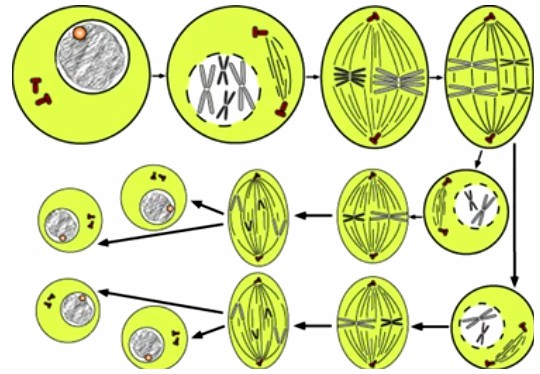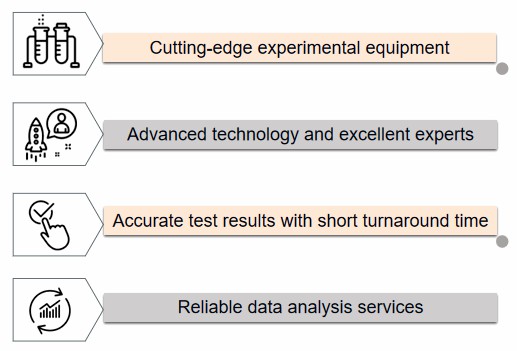The cell cycle refers to all the processes that a cell undergoes from the completion of the last division to the end of the next division, including interphase and division (M phase), of which interphase can be divided into the pre-DNA synthesis (G1 phase), DNA synthesis (S phase), DNA synthesis (G2 phase). The G0 phase is a quiescent cell, which is temporarily out of the cell cycle, stopping cell division, but can re-enter the cell cycle for division under certain conditions. They temporarily leave the cell cycle and stop cell division but can re-enter the cell cycle and divide under certain conditions. The cell is the basic unit of life activity, and the cell cycle is closely related to cell proliferation and differentiation. Therefore, the detection of the cell cycle is crucial. The amount of DNA in a cell changes periodically as the cell cycle progresses, and the relative amount of DNA in a cell can be measured by flow cytometry to analyze the percentage of each phase of the cell cycle.
Lifeasible is dedicated to the field of plant research. With an advanced technology platform and a strong team of expert technicians, we have been providing effective technical support for cell cycle assays. We can effectively analyze the percentage of each stage of the cell cycle by measuring the relative amount of intracellular DNA by flow cytometry.

Detecting the plant cell cycle using flow cytometric analysis
One of the earliest applications of flow cytometry was to analyze the cell cycle by quantifying DNA content. Plant DNA can be stained with a variety of DNA-conjugating dyes. It is important to note that these dyes are stoichiometric, i.e., they bind to the DNA in the cell in a certain ratio. In this way, S-phase cells, which have a higher DNA content than G1-phase cells, absorb proportionally more dye and fluoresce more brightly until the cell's DNA replication is complete. As a result, G2 phase cells are about twice as bright as G1 phase cells. In most cases, we fix or permeabilize the cells before the dye can enter them; otherwise, the dye is actively pumped out by the living cells. Alcohols or aldehydes are commonly used for fixation. Alcohols are dehydrating fixatives that also act as permeabilizers. Once the cells are fixed, the samples can be deposited, stained, and analyzed at the end of the experiment. Alcohol-fixed cells remain stable at 4 °C for several weeks. Aldehyde-fixed cells remain stable for 2 to 3 days. Another way to get the DNA dye into the cells is to permeabilize the cells with detergent. Permeabilized cells cannot be stored for as long as fixed cells and should be processed within a few hours. Intracellular staining usually requires a combination of fixation (paraformaldehyde) and permeabilization. The methods we use in plant cell cycle assays depend on the specific experiment and the data the client is trying to obtain. Some of the dyes we commonly used to determine DNA content in plant cell cycle assays are propidium iodide (PI), 4,6-diamidino-2-phenylindole (DAPI), 7-amino-actinomycin (7-AAD), and others.
The cell cycle is a fundamental feature of all living organisms. In the eukaryotic cell cycle, the S- and M-phase entrances appear to be controlled by a group of proteins called cyclins (Cyc) in complex with their cyclin-dependent kinases (CDKs), and the regulation mechanism is conserved. On the other hand, due to the existence of multiple Cyc/CDKs complexes and the ability of eukaryotic cell division to respond appropriately to internal and external signals, there is inevitably a diversity of regulatory mechanisms. Studying the cell cycle and its regulatory mechanisms will reveal the nature of eukaryotic growth and development and regulate it at multiple levels.
The importance of cell cycle regulation in plant growth and development has been increasingly emphasized. Experiments on the regulation of certain cell cycle genes in specific plant tissues or cells and in response to regulatory factors have shown that the cell cycle process influences the differentiation and development of plant cells, that shifts in the pattern of cell development in meristematic tissues are clearly related to the duration of the cell cycle and the proportion of actively dividing cells, and that plant growth is also responsive to external conditions, such as CO2 levels.

Lifeasible is dedicated to plant cell biology. We offer a variety of solutions to problems encountered in research related to plant cell biology. We welcome collaborations with others to advance the field of plant cell research. If you are interested in us, please feel free to contact us.